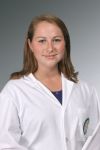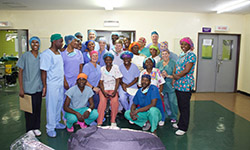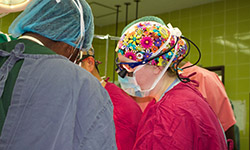by Mary Elaine Killian, MD
The University Teaching Hospital in Lusaka, the capital and largest city in Zambia, is a massive complex with 1,800 beds and multiple departments, but there are no pediatric urologists. From September 22 to October 2, 2015, IVUmed, a nonprofit organization committed to making quality urological care available worldwide, hosted a pediatric urology week at the hospital to help address this unmet need. I was thrilled to participate as an IVUmed Resident Scholar, sponsored by the AUA Southeastern Section.
On the first day, the pediatric nursing station served as our clinic room, and patients -- many of whom traveled long distances -- lined up around the ward to be seen. We developed an efficient triage center, with stations for basic information such as weight to be recorded, and places for examinations by the local and IVUmed urologists and anesthesiologists.
 We evaluated more than 50 patients with a wide range of urologic issues, including hypospadias, trauma, epispadias, fistulae, UPJ obstruction, exstrophy, and posterior urethral valves. The need for pediatric urologists was evident with each patient we saw. Children who would have had surgery before one year of age in the United States were presenting for the first time at six years of age or older, or with indwelling catheters instead of undergoing immediate surgery. After clinic, we had the difficult task of arranging this operating schedule for the week. Since there were only enough time and resources for about 25 cases, we had to pick the cases best suited for operation that week.
We evaluated more than 50 patients with a wide range of urologic issues, including hypospadias, trauma, epispadias, fistulae, UPJ obstruction, exstrophy, and posterior urethral valves. The need for pediatric urologists was evident with each patient we saw. Children who would have had surgery before one year of age in the United States were presenting for the first time at six years of age or older, or with indwelling catheters instead of undergoing immediate surgery. After clinic, we had the difficult task of arranging this operating schedule for the week. Since there were only enough time and resources for about 25 cases, we had to pick the cases best suited for operation that week.
We performed numerous hypospadias repairs, some of which were repeat operations due to extensive scarring or wound breakdown. These are problems that we encounter in the United States but seemed to be more significant in this patient population. We also saw a three-year-old who had a ureteropelvic junction obstruction. His kidney was so dilated that it was easily palpable on physical exam and he had close to one liter of urine drain out intra-operatively once the obstruction was relieved. With the severity of his pathology, it might have been picked up on routine prenatal ultrasounds had he been in the United States. Several of the other cases performed were for patients with posterior urethral valves which were being managed with indwelling catheters, since they do not have a pediatric resectoscope with which to treat this problem. Procedures that would have been outpatient in the States were admitted to the hospital for management, largely due to the travel and financial limitations of many of the families.
 Since medical school, I have wanted to participate in an international medical mission trip. I was overjoyed to be admitted to the IVUmed Resident Scholars Program, and the experience I gained exceeded my expectations. Working with the local urologists was an incredible and educational experience. I learned much about patient care, adaptability, and resourcefulness. Our host and local urologist at UTH, Dr. Nenad Spasojevic, is one of the most energetic, creative, and innovative persons I have ever met. “No” is not a word in his vocabulary. The week was not without difficulties, but he was able to find a solution to any issue we encountered, and his work ethic was unmatched.
Since medical school, I have wanted to participate in an international medical mission trip. I was overjoyed to be admitted to the IVUmed Resident Scholars Program, and the experience I gained exceeded my expectations. Working with the local urologists was an incredible and educational experience. I learned much about patient care, adaptability, and resourcefulness. Our host and local urologist at UTH, Dr. Nenad Spasojevic, is one of the most energetic, creative, and innovative persons I have ever met. “No” is not a word in his vocabulary. The week was not without difficulties, but he was able to find a solution to any issue we encountered, and his work ethic was unmatched.
During that week, the IVUmed attending urologists Dr. Stephany and Dr. Oottamasathien worked with the local residents and staff on each case, focusing on teaching. The patience, thoroughness, and expertise they displayed was inspiring. IVUmed’s motto is “Teach One, Reach Many”, and I plan to embody that by incorporating what I learned during the mission trip into my patient care back in the U.S. Similar to UAB, University Teaching Hospital in Zambia deals with a broad a range of pathology, but without the tools and resources that I realized I take for granted in Birmingham. I consider myself very fortunate to have learned from the creativity, problem-solving skills, and perseverance of the IVUmed staff and local urologists in Zambia.